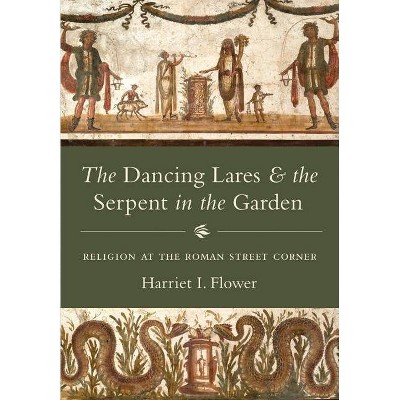The Dancing Lares and the Serpent in the Garden - by Harriet I Flower (Hardcover)

Similar Products
Products of same category from the store
AllProduct info
<p/><br></br><p><b> Book Synopsis </b></p></br></br><p>The most pervasive gods in ancient Rome had no traditional mythology attached to them, nor was their worship organized by elites. Throughout the Roman world, neighborhood street corners, farm boundaries, and household hearths featured small shrines to the beloved <i>lares</i>, a pair of cheerful little dancing gods. These shrines were maintained primarily by ordinary Romans, and often by slaves and freedmen, for whom the <i>lares</i> cult provided a unique public leadership role. In this comprehensive and richly illustrated book, the first to focus on the <i>lares</i>, Harriet Flower offers a strikingly original account of these gods and a new way of understanding the lived experience of everyday Roman religion. <p/>Weaving together a wide range of evidence, Flower sets forth a new interpretation of the much-disputed nature of the <i>lares</i>. She makes the case that they are not spirits of the dead, as many have argued, but rather benevolent protectors--gods of place, especially the household and the neighborhood, and of travel. She examines the rituals honoring the <i>lares</i>, their cult sites, and their iconography, as well as the meaning of the snakes often depicted alongside <i>lares</i> in paintings of gardens. She also looks at Compitalia, a popular midwinter neighborhood festival in honor of the <i>lares</i>, and describes how its politics played a key role in Rome's increasing violence in the 60s and 50s BC, as well as in the efforts of Augustus to reach out to ordinary people living in the city's local neighborhoods. <p/>A reconsideration of seemingly humble gods that were central to the religious world of the Romans, this is also the first major account of the full range of <i>lares</i> worship in the homes, neighborhoods, and temples of ancient Rome.</p><p/><br></br><p><b> From the Back Cover </b></p></br></br><p>"Harriet Flower's book is important for understanding the history of ancient Roman religion and the late republic. Above all, it is original and convincing in stressing the ubiquitous and pervading character of the cult of the <i>lares</i> in Rome and a number of other places in the Roman world."<b>--Jörg Rüpke, University of Erfurt, Germany</b></p><p>"This important book provides a comprehensive treatment of the <i>lares</i>, the ancient Roman household gods, in all the contexts in which they are well-documented, revealing them to be much more significant than conventionally understood. Harriet Flower has yet again identified a neglected aspect of Roman life and produced a definitive treatment that illuminates an extraordinary range of further areas."<b>--Catherine Steel, University of Glasgow</b></p><p/><br></br><p><b> Review Quotes </b></p></br></br><br>Engagingly written and accessible, this book will appeal to a wide range of scholars and students interested in the nexus of religion, social class, and politics and definitely should be read by all who have an interest in Roman religion.<b>---Lora J. Holland, <i>Religious Studies Review</i></b><br><br><p>Flower's meticulous investigation of the Roman lares is a formidable undertaking that<br>reveals these gods as the unsung epicentre of Roman religion. . . . Ultimately, then, what emerges from F.'s study is a deeper appreciation of the calculated religious significance of the Augustan brand.</p><b>---Heidi Wendt, <i>Journal of Roman Studies</i></b><br><br>Detailed, absorbing and beautifully illustrated . . . this is a book that demands, and deserves, serious engagement.<b>---T. P. Wiseman, <i>Times Literary Supplement</i></b><br><br>Flower has accomplished a great feat by encapsulating in one invaluable text the many facets of the Lares cults and their relationship with Romans as joyous guardians intended for the benefit of all Roman people.<b>---Candace R. Macintosh, <i>Classical Review</i></b><br><br>In <i>The Dancing Lares and the Serpent in the Garden: Religion at the Roman Street Corner</i>, Harriet I. Flower displays a formidable grasp of historical detail and a taste for scholarly disputes. Her book is superbly produced and richly illustrated in color with maps and photographs.<b>---Marina Warner, <i>New York Review of Books</i></b><br><br>Not only will this be an indispensable starting pointfor anyone working on any topic connected with the <i>lares</i>, it also constitutes a valuable model for one highly effective way to study religion in a world without 'religion'.<b>---James B. Rives, <i>Bryn Mawr Classical Review</i></b><br><br>Winner of a 2018 Charles Goodwin Award of Merit, Society for Classical Studies<br><p/><br></br><p><b> About the Author </b></p></br></br><b>Harriet I. Flower</b> is professor of classics at Princeton University. She is the author of <i>Roman Republics</i> (Princeton), <i>The Art of Forgetting: Disgrace and Oblivion in Roman Political Culture</i>, and <i>Ancestor Masks and Aristocratic Power in Roman Culture. </i>She is also the editor of <i>The Cambridge Companion to the Roman Republic</i>.
Price History
Price Archive shows prices from various stores, lets you see history and find the cheapest. There is no actual sale on the website. For all support, inquiry and suggestion messagescommunication@pricearchive.us




















